This content originally appeared on Level Up Coding - Medium and was authored by Manoj Chemate
If you are new to Java this article will help you to understand 7 confusing concepts.

1. Ignoring Pass By Value Nature Of Java
do you see the bug here?
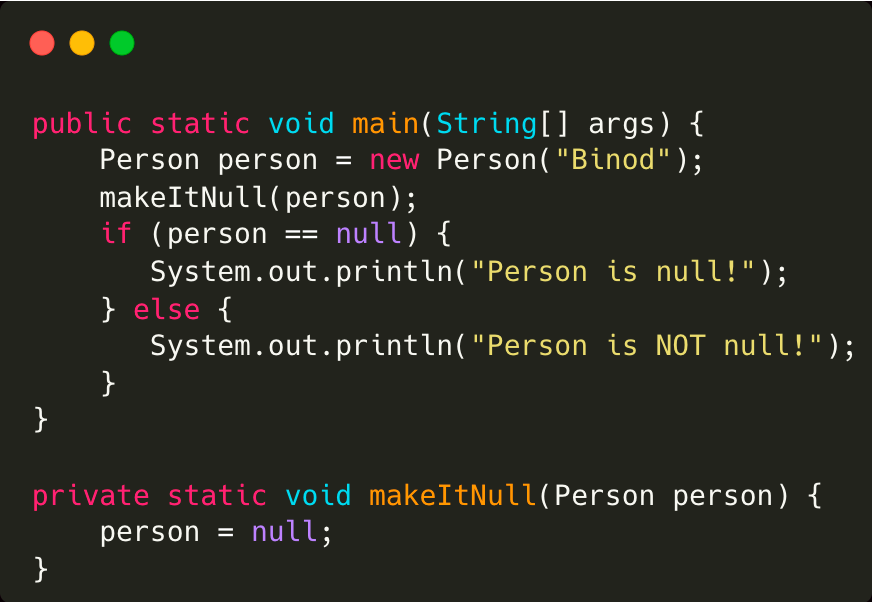
Here, person will not be null since Java is pass by value and not pass by reference. what does that mean?
There are three parts here, actual person object is created on the heap, then there is a reference that points to that person object on the heap, and the reference itself has a value that represents the location of the object on the heap, here bob is a reference that is pointing to its person object on the heap and bob as a reference also has some value representing object location. ( It is not the exact address )
so,
When the bob is passed as a parameter to makeItNull() method, the value of bob reference is copied to bob1 reference, and not the actual heap object, when bob1 is assigned to null, the value of bob1 reference becomes null but the value of the original bob reference does not change.
When passing primitive data, JVM copies the value of the primitive data type. If int x=5, then 5 itself will be copied.
When a passing object, value of reference is copied to another variable and not the actual object.
and hence java is considered pass-by-value and not pass-by-reference.
In pass-by-reference languages, the original bob would have become null.
2. Breaking Hashcode-Equals Contract
what is missing here ?
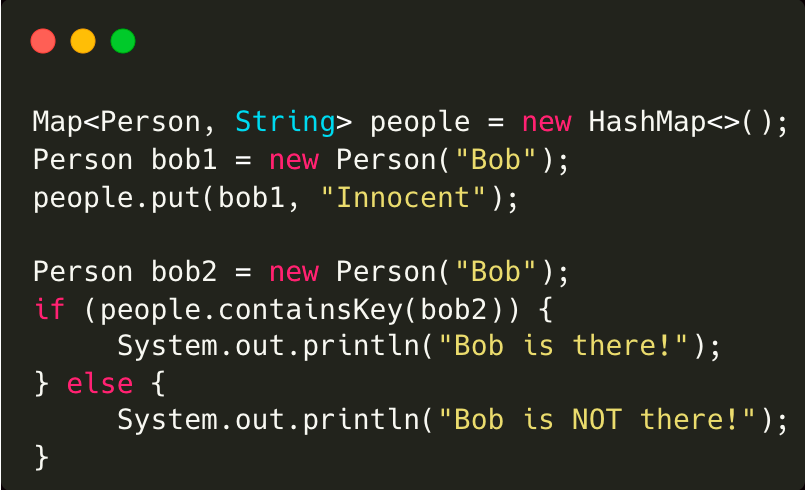
If you don’t override the hashcode-equals method in the Person class, Bob will not be there, even if they are the same objects from a business perspective.
why?
HashMap, HashSet, and Hashtable identify duplicate keys using hashcode and equals method,
While storing objects, the hash code integer is calculated using the hashcode method, if the map already contains that hash code then the equals method will be called to check if objects are really same, and if they are the same, then values will be replaced.
Similarly while retrieving objects, if the hashcode() is the same then equals() is called to check if it’s the same key and if yes then the value is returned.
Here, while storing objects, since the hashcode() and equals() method is not overridden, Object class’s hashcode and equals method will be called
Object class’s hashcode method returns a different value for every new object in JVM.
Object class’s equal method does reference comparison.
so the hashcode for bob and bob1 will be different. Hash of bob1 will not be present in the map.
Remember the simple contract:
If the equals method is overridden in some class,
- You must override the hashcode method in such a way that If the equals method returns true for two objects, then the hashcode method must return the same integer for those objects.
- If objects are not the same by the equals method, then they may or may not return the same hashcode.
Even if you have overridden the hashcode-equals, It is not good practice to use mutable objects as keys, because later if keys get modified, they cannot be retrieved since the hashcode-equals will change results due to modification.
3. Modifying Collection While Iterating
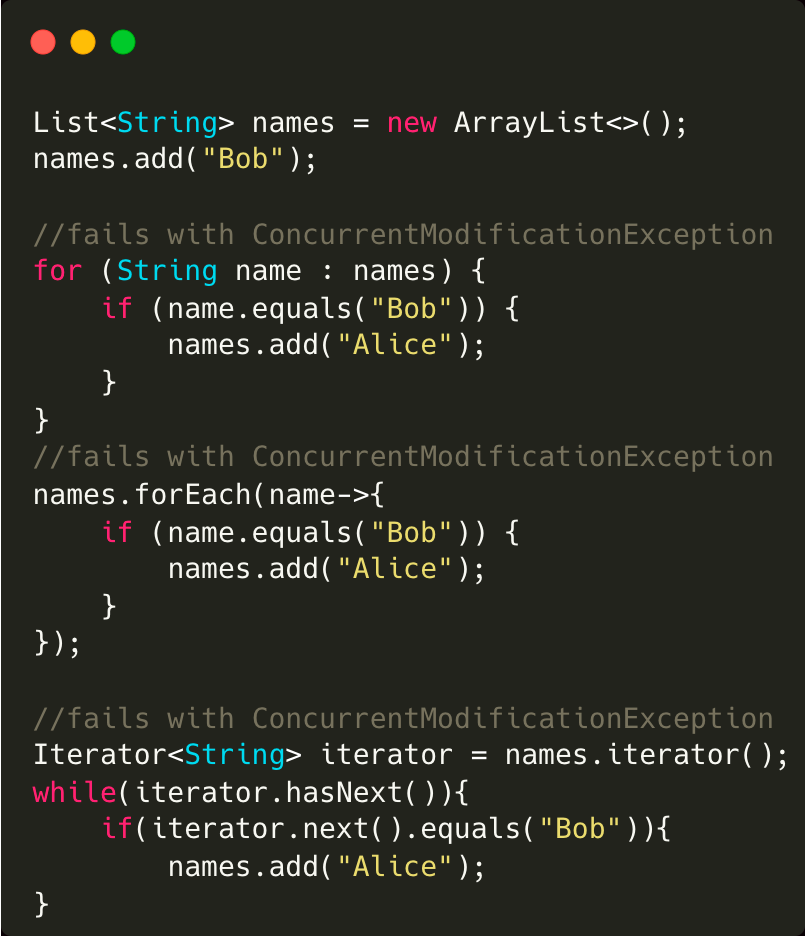
- If you try to add or remove objects while iterating over them using a fail-fast iterator, you will get ConcurrentModificationException.
- Fail fast iterator works on the original collection and uses an internal flag modCount to check if there are any structural changes in the collection. If yes, it will fail the execution.
Solution:
- you can use thread-safe equivalent of collections java.util.concurrent.CopyOnWriteArrayList or java.util.concurrent.CopyOnWriteArraySet on which the iterator uses a copy of the original array to traverse and makes modifications to the original array.
- You can also use ConcurrentHashMap, although it does not use a copy of the original collection to traverse, it has a non-fail fast implementation.
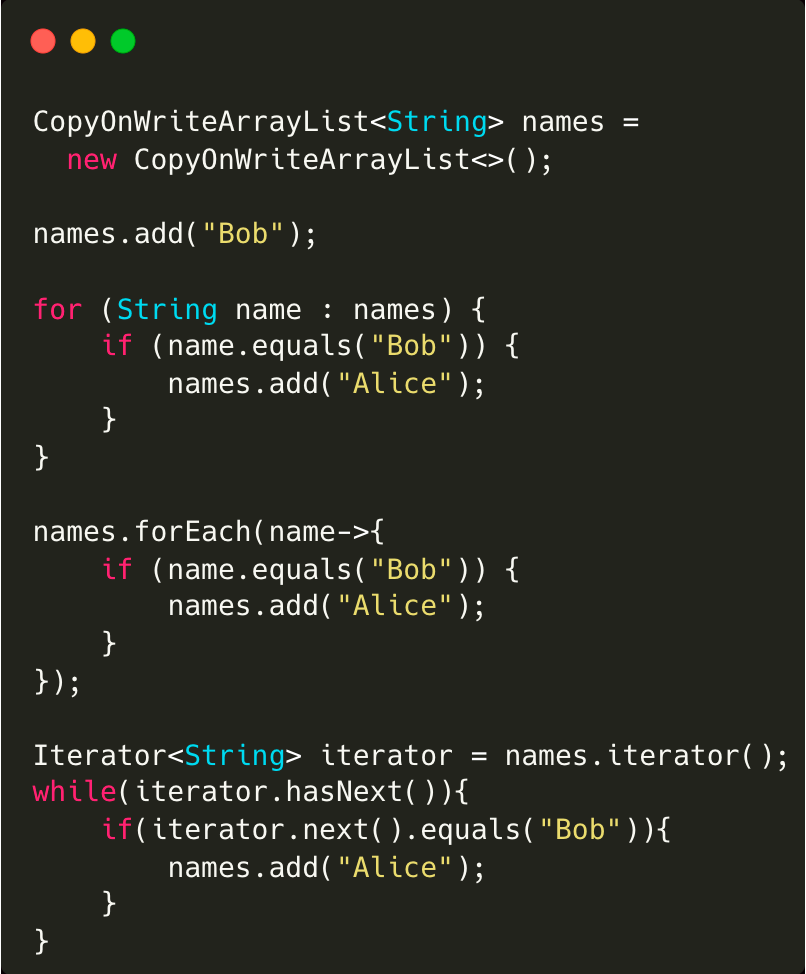
4. Not Closing System Resources
- Java application uses several types of resources such as files, streams, sockets, and database connections. We need to ensure that they get freed even in case of errors.
- Since every application has a limited of resources assigned, overusing resources leads to restarting the application multiple times and affecting other applications in the same environment.
How to close resources?
You can use finally block or try-with-resource block introduced in Java 7. While using try-with-resource, you can declare multiple resources, each resource must implement java.io.AutoCloseable interface which has close() method to specify how resources will be closed. This method will always be called by JVM after finishing the try block successfully or with an exception.
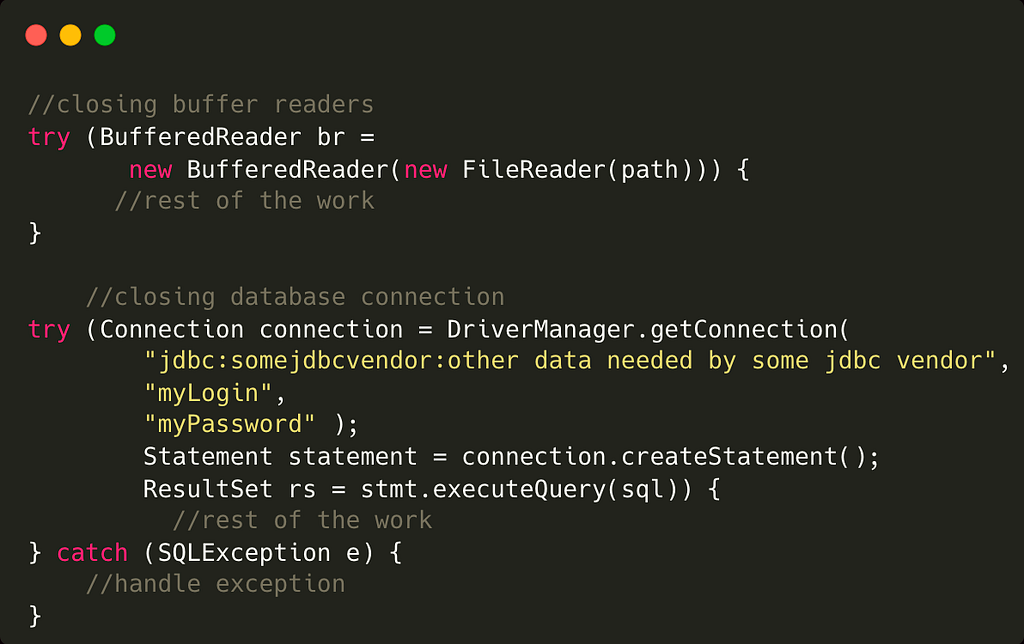
5. Modifying Immutable Objects

- Here Arrays.asList() gives an immutable list in which we are trying to add another name hence we will get UnsupportedOperationException here.
- The state of immutable objects can’t be changed and should not be changed. If it is required then the object itself should not be immutable.
6. Visibility of Variable In Multithreading Environment
Do you think MyThread will always stop here?
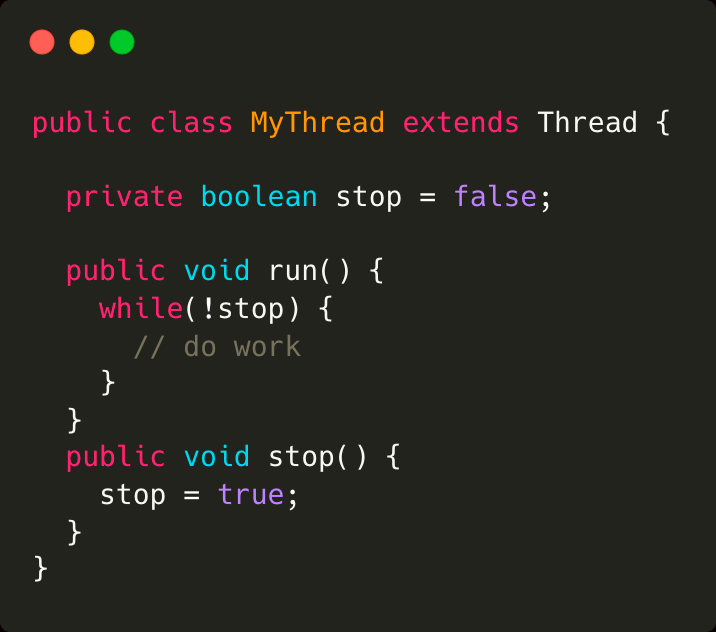
- If stop() method is executed by some other thread, it is possible that true value of stop variable will never be visible to MyThread if it has cached variable’s value.
- If a variable is shared by multiple threads, changes made by one thread may or may not be visible to the other thread. why?
- When a thread tries to modify the value of a variable, depending on CPU architecture, the value of the variable may be copied to CPU core’s local cache instead of always reading it from the main memory to improve performance, which will not be visible to another thread working on it at the same time.
Solution,
So using a volatile modifier ensures that threads will always see the updated values.

7. Using == Instead of equals for Object Comparison
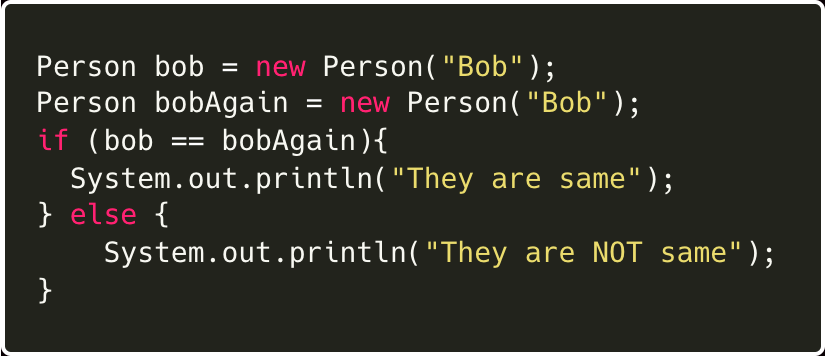
- Here, bob and bobAgain refer to different objects in the heap hence reference comparision (==) will return false and else block will be executed. It will return true only both refrences point to same object in the memory.
- equals(other) method checks actual content of object. Ofcourse it depend on how you override equals method.
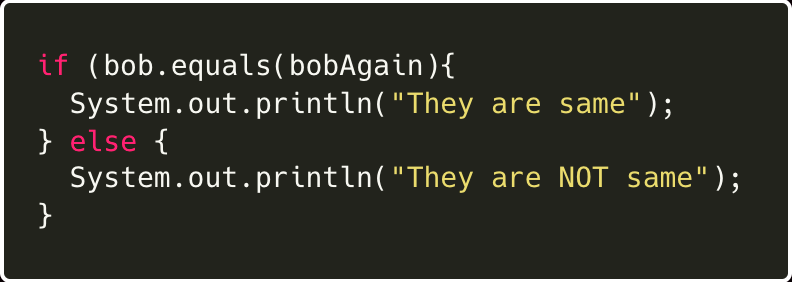
Enums are by default singleton in Java so all references of same enum will be pointing to same object and hence reference comparsion works for enums.
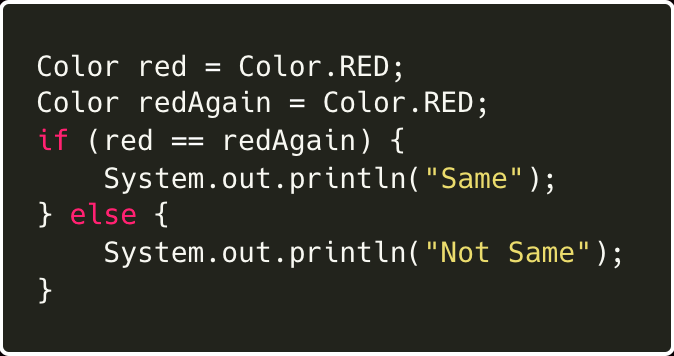
so here, If block will get executed
that’s it, if you like the content do follow! Check out my other post on Java Streams!
8 Years of Java Stream API, Understand Streams Through 8 Questions!
Thanks!
7 Mistakes That Novice Java Developers Commit! was originally published in Level Up Coding on Medium, where people are continuing the conversation by highlighting and responding to this story.
This content originally appeared on Level Up Coding - Medium and was authored by Manoj Chemate
Manoj Chemate | Sciencx (2022-10-06T14:51:43+00:00) 7 Mistakes That Novice Java Developers Commit!. Retrieved from https://www.scien.cx/2022/10/06/7-mistakes-that-novice-java-developers-commit/
Please log in to upload a file.
There are no updates yet.
Click the Upload button above to add an update.
